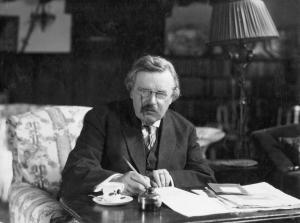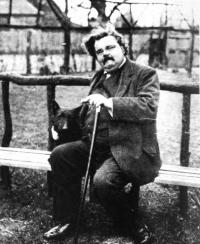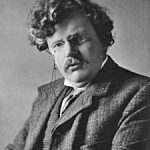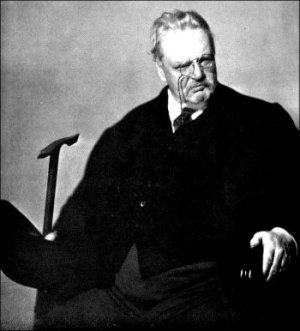Fleurs du Mal Magazine


Or see the index

A Fairy Tale
All things grew upwards, foul and fair:
The great trees fought and beat the air
With monstrous wings that would have flown;
But the old earth clung to her own,
Holding them back from heavenly wars,
Though every flower sprang at the stars.
But he broke free: while all things ceased,
Some hour increasing, he increased.
The town beneath him seemed a map,
Above the church he cocked his cap,
Above the cross his feather flew
Above the birds and still he grew.
The trees turned grass; the clouds were riven;
His feet were mountains lost in heaven;
Through strange new skies he rose alone,
The earth fell from him like a stone,
And his own limbs beneath him far
Seemed tapering down to touch a star.
He reared his head, shaggy and grim,
Staring among the cherubim;
The seven celestial floors he rent,
One crystal dome still o’er him bent:
Above his head, more clear than hope,
All heaven was a microscope.
G. K. Chesterton
(1874-1936)
A Fairy Tale
• fleursdumal.nl magazine
More in: Archive C-D, Chesterton, Gilbert Keith, G.K. Chesterton, Grimm, Andersen e.o.: Fables, Fairy Tales & Stories

Nightmare
The silver and violet leopard of the night
Spotted with stars and smooth with silence sprang;
And though three doors stood open, the end of light
Closed like a trap; and stillness was a clang.
Under the leopard sky of lurid stars
I strove with evil sleep the hot night long,
Dreams dumb and swollen of triumphs without wars,
Of tongueless trumpet and unanswering gong.
I saw a pale imperial pomp go by,
Helmet and hornèd mitre and heavy wreath;
Their high strange ensigns hung upon the sky
And their great shields were like the doors of death.
Their mitres were as moving pyramids
And all their crowns as marching towers were tall;
Their eyes were cold under their carven lids
And the same carven smile was on them all.
Over a paven plain that seemed unending
They passed unfaltering till it found an end
In one long shallow step; and these descending
Fared forth anew as long away to wend.
I thought they travelled for a thousand years;
And at the end was nothing for them all,
For all that splendour of sceptres and of spears,
But a new step, another easy fall.
The smile of stone seemed but a little less,
The load of silver but a little more:
And ever was that terraced wilderness
And falling plain paved like a palace floor.
Rust red as gore crawled on their arms of might
And on their faces wrinkles and not scars:
Till the dream suddenly ended; noise and light
Loosened the tyranny of the tropic stars.
But over them like a subterranean sun
I saw the sign of all the fiends that fell;
And a wild voice cried “Hasten and be done,
Is there no steepness in the stairs of hell?”
He that returns, He that remains the same,
Turned the round real world, His iron vice;
Down the grey garden paths a bird called twice,
And through three doors mysterious daylight came.
Gilbert Keith Chesterton
(1874 – 1936)
Nightmare
• fleursdumal.nl magazine
More in: Archive C-D, Archive C-D, Chesterton, Gilbert Keith, G.K. Chesterton

G.K. Chesterton
Lepanto
White founts falling in the Courts of the sun,
And the Soldan of Byzantium is smiling as they run;
There is laughter like the fountains in that face of all men feared,
It stirs the forest darkness, the darkness of his beard;
It curls the blood-red crescent, the crescent of his lips;
For the inmost sea of all the earth is shaken with his ships.
They have dared the white republics up the capes of Italy,
They have dashed the Adriatic round the Lion of the Sea,
And the Pope has cast his arms abroad for agony and loss,
And called the kings of Christendom for swords about the Cross.
The cold queen of England is looking in the glass;
The shadow of the Valois is yawning at the Mass;
From evening isles fantastical rings faint the Spanish gun,
And the Lord upon the Golden Horn is laughing in the sun.
Dim drums throbbing, in the hills half heard,
Where only on a nameless throne a crownless prince has stirred,
Where, risen from a doubtful seat and half attainted stall,
The last knight of Europe takes weapons from the wall,
The last and lingering troubadour to whom the bird has sung,
That once went singing southward when all the world was young.
In that enormous silence, tiny and unafraid,
Comes up along a winding road the noise of the Crusade.
Strong gongs groaning as the guns boom far,
Don John of Austria is going to the war,
Stiff flags straining in the night-blasts cold
In the gloom black-purple, in the glint old-gold,
Torchlight crimson on the copper kettle-drums,
Then the tuckets, then the trumpets, then the cannon, and he comes.
Don John laughing in the brave beard curled,
Spurning of his stirrups like the thrones of all the world,
Holding his head up for a flag of all the free.
Love-light of Spain–hurrah!
Death-light of Africa!
Don John of Austria
Is riding to the sea.
Mahound is in his paradise above the evening star,Lepanto
(Don John of Austria is going to the war.)
He moves a mighty turban on the timeless houri’s knees,
His turban that is woven of the sunsets and the seas.
He shakes the peacock gardens as he rises from his ease,
And he strides among the tree-tops and is taller than the trees;
And his voice through all the garden is a thunder sent to bring
Black Azrael and Ariel and Ammon on the wing.
Giants and the Genii,
Multiplex of wing and eye,
Whose strong obedience broke the sky
When Solomon was king.
They rush in red and purple from the red clouds of the morn,
From the temples where the yellow gods shut up their eyes in scorn;
They rise in green robes roaring from the green hells of the sea
Where fallen skies and evil hues and eyeless creatures be,
On them the sea-valves cluster and the grey sea-forests curl,
Splashed with a splendid sickness, the sickness of the pearl;
They swell in sapphire smoke out of the blue cracks of the ground,–
They gather and they wonder and give worship to Mahound.
And he saith, “Break up the mountains where the hermit-folk can hide,
And sift the red and silver sands lest bone of saint abide,
And chase the Giaours flying night and day, not giving rest,
For that which was our trouble comes again out of the west.
We have set the seal of Solomon on all things under sun,
Of knowledge and of sorrow and endurance of things done.
But a noise is in the mountains, in the mountains, and I know
The voice that shook our palaces–four hundred years ago:
It is he that saith not ‘Kismet’; it is he that knows not Fate;
It is Richard, it is Raymond, it is Godfrey at the gate!
It is he whose loss is laughter when he counts the wager worth,
Put down your feet upon him, that our peace be on the earth.”
For he heard drums groaning and he heard guns jar,
(Don John of Austria is going to the war.)
Sudden and still–hurrah!
Bolt from Iberia!
Don John of Austria
Is gone by Alcalar.
St. Michaels on his Mountain in the sea-roads of the north
(Don John of Austria is girt and going forth.)
Where the grey seas glitter and the sharp tides shift
And the sea-folk labour and the red sails lift.
He shakes his lance of iron and he claps his wings of stone;
The noise is gone through Normandy; the noise is gone alone;
The North is full of tangled things and texts and aching eyes,
And dead is all the innocence of anger and surprise,
And Christian killeth Christian in a narrow dusty room,
And Christian dreadeth Christ that hath a newer face of doom,
And Christian hateth Mary that God kissed in Galilee,–
But Don John of Austria is riding to the sea.
Don John calling through the blast and the eclipse
Crying with the trumpet, with the trumpet of his lips,
Trumpet that sayeth ha!
Domino gloria!
Don John of Austria
Is shouting to the ships.
King Philip’s in his closet with the Fleece about his neck
(Don John of Austria is armed upon the deck.)
The walls are hung with velvet that is black and soft as sin,
And little dwarfs creep out of it and little dwarfs creep in.
He holds a crystal phial that has colours like the moon,
He touches, and it tingles, and he trembles very soon,
And his face is as a fungus of a leprous white and grey
Like plants in the high houses that are shuttered from the day,
And death is in the phial and the end of noble work,
But Don John of Austria has fired upon the Turk.
Don John’s hunting, and his hounds have bayed–
Booms away past Italy the rumour of his raid.
Gun upon gun, ha! ha!
Gun upon gun, hurrah!
Don John of Austria
Has loosed the cannonade.
The Pope was in his chapel before day or battle broke,
(Don John of Austria is hidden in the smoke.)
The hidden room in man’s house where God sits all the year,
The secret window whence the world looks small and very dear.
He sees as in a mirror on the monstrous twilight sea
The crescent of his cruel ships whose name is mystery;
They fling great shadows foe-wards, making Cross and Castle dark,
They veil the plumèd lions on the galleys of St. Mark;
And above the ships are palaces of brown, black-bearded chiefs,
And below the ships are prisons, where with multitudinous griefs,
Christian captives sick and sunless, all a labouring race repines
Like a race in sunken cities, like a nation in the mines.
They are lost like slaves that sweat, and in the skies of morning hung
The stair-ways of the tallest gods when tyranny was young.
They are countless, voiceless, hopeless as those fallen or fleeing on
Before the high Kings’ horses in the granite of Babylon.
And many a one grows witless in his quiet room in hell
Where a yellow face looks inward through the lattice of his cell,
And he finds his God forgotten, and he seeks no more a sign–
(But Don John of Austria has burst the battle-line!)
Don John pounding from the slaughter-painted poop,
Purpling all the ocean like a bloody pirate’s sloop,
Scarlet running over on the silvers and the golds,
Breaking of the hatches up and bursting of the holds,
Thronging of the thousands up that labour under sea
White for bliss and blind for sun and stunned for liberty.
Vivat Hispania!
Domino Gloria!
Don John of Austria
Has set his people free!
Cervantes on his galley sets the sword back in the sheath
(Don John of Austria rides homeward with a wreath.)
And he sees across a weary land a straggling road in Spain,
Up which a lean and foolish knight for ever rides in vain,
And he smiles, but not as Sultans smile, and settles back the blade….
(But Don John of Austria rides home from the Crusade.)
G. K. Chesterton (1874 – 1936)
Poetry: Lepanto
fleursdumal.nl magazine
More in: Archive C-D, Chesterton, Gilbert Keith, G.K. Chesterton

G.K. Chesterton
A Ballade of Suicide
The gallows in my garden, people say,
Is new and neat and adequately tall;
I tie the noose on in a knowing way
As one that knots his necktie for a ball;
But just as all the neighbours on the wall
Are drawing a long breath to shout “Hurray!”
The strangest whim has seized me. . . After all
I think I will not hang myself to-day.
To-morrow is the time I get my pay
My uncle’s sword is hanging in the hall
I see a little cloud all pink and grey
Perhaps the rector’s mother will NOT call
I fancy that I heard from Mr. Gall
That mushrooms could be cooked another way
I never read the works of Juvenal
I think I will not hang myself to-day.
The world will have another washing-day;
The decadents decay; the pedants pall;
And H.G. Wells has found that children play,
And Bernard Shaw discovered that they squall;
Rationalists are growing rational
And through thick woods one finds a stream astray,
So secret that the very sky seems small
I think I will not hang myself to-day.
ENVOI
Prince, I can hear the trumpet of Germinal,
The tumbrils toiling up the terrible way;
Even to-day your royal head may fall
I think I will not hang myself to-day.
G. K. Chesterton (1874 – 1936)
A Ballade of Suicide
fleursdumal.nl magazine
More in: Archive C-D, Chesterton, Gilbert Keith, G.K. Chesterton, Suicide

Gilbert Keith Chesterton
(1874-1936)
BY THE BABE UNBORN
If trees were tall and grasses short,
As in some crazy tale,
If here and there a sea were blue
Beyond the breaking pale,
If a fixed fire hung in the air
To warm me one day through,
If deep green hair grew on great hills,
I know what I should do.
In dark I lie: dreaming that there
Are great eyes cold or kind,
And twisted streets and silent doors,
And living men behind.
Let storm-clouds come: better an hour,
And leave to weep and fight,
Than all the ages I have ruled
The empires of the night.
I think that if they gave me leave
Within that world to stand,
I would be good through all the day
I spent in fairyland.
They should not hear a word from me
Of selfishness or scorn,
If only I could find the door,
If only I were born.
THE DONKEY
When fishes flew and forests walked
And figs grew upon thorn,
Some moment when the moon was blood
Then surely I was born;
With monstrous head and sickening cry
And ears like errant wings,
The devil’s walking parody
On all four-footed things.
The tattered outlaw of the earth,
Of ancient crooked will;
Starve, scourge, deride me: I am dumb,
I keep my secret still.
Fools! For I also had my hour;
One far fierce hour and sweet:
There was a shout about my ears,
And palms before my feet.
THE SONG OF THE CHILDREN
The World is ours till sunset,
Holly and fire and snow;
And the name of our dead brother
Who loved us long ago.
The grown folk mighty and cunning,
They write his name in gold;
But we can tell a little
Of the million tales he told.
He taught them laws and watchwords,
To preach and struggle and pray;
But he taught us deep in the hayfield
The games that the angels play.
Had he stayed here for ever,
Their world would be wise as ours–
And the king be cutting capers,
And the priest be picking flowers.
But the dark day came: they gathered:
On their faces we could see
They had taken and slain our brother,
And hanged him on a tree.
THOU SHALT NOT KILL
I had grown weary of him; of his breath
And hands and features I was sick to death.
Each day I heard the same dull voice and tread;
I did not hate him: but I wished him dead.
And he must with his blank face fill my life–
Then my brain blackened; and I snatched a knife.
But ere I struck, my soul’s grey deserts through
A voice cried, ‘Know at least what thing you do.’
‘This is a common man: knowest thou, O soul,
What this thing is? somewhere where seasons roll
There is some living thing for whom this man
Is as seven heavens girt into a span,
For some one soul you take the world away–
Now know you well your deed and purpose. Slay!’
Then I cast down the knife upon the ground
And saw that mean man for one moment crowned.
I turned and laughed: for there was no one by–
The man that I had sought to slay was I.

THE MIRROR OF MADMEN
I dreamed a dream of heaven, white as frost,
The splendid stillness of a living host;
Vast choirs of upturned faces, line o’er line.
Then my blood froze; for every face was mine.
Spirits with sunset plumage throng and pass,
Glassed darkly in the sea of gold and glass.
But still on every side, in every spot,
I saw a million selves, who saw me not.
I fled to quiet wastes, where on a stone,
Perchance, I found a saint, who sat alone;
I came behind: he turned with slow, sweet grace,
And faced me with my happy, hateful face.
I cowered like one that in a tower doth bide,
Shut in by mirrors upon every side;
Then I saw, islanded in skies alone
And silent, one that sat upon a throne.
His robe was bordered with rich rose and gold,
Green, purple, silver out of sunsets old;
But o’er his face a great cloud edged with fire,
Because it covereth the world’s desire.
But as I gazed, a silent worshipper,
Methought the cloud began to faintly stir;
Then I fell flat, and screamed with grovelling head,
‘If thou hast any lightning, strike me dead!
‘But spare a brow where the clean sunlight fell,
The crown of a new sin that sickens hell.
Let me not look aloft and see mine own
Feature and form upon the Judgment-throne.’
Then my dream snapped: and with a heart that leapt
I saw across the tavern where I slept,
The sight of all my life most full of grace,
A gin-damned drunkard’s wan half-witted face.
THE SKELETON
Chattering finch and water-fly
Are not merrier than I;
Here among the flowers I lie
Laughing everlastingly.
No: I may not tell the best;
Surely, friends, I might have guessed
Death was but the good King’s jest,
It was hid so carefully.
THE HAPPY MAN
To teach the grey earth like a child,
To bid the heavens repent,
I only ask from Fate the gift
Of one man well content.
Him will I find: though when in vain
I search the feast and mart,
The fading flowers of liberty,
The painted masks of art.
I only find him at the last,
On one old hill where nod
Golgotha’s ghastly trinity–
Three persons and one god.
A NOVELTY
Why should I care for the Ages
Because they are old and grey?
To me, like sudden laughter,
The stars are fresh and gay;
The world is a daring fancy,
And finished yesterday.
Why should I bow to the Ages
Because they were drear and dry?
Slow trees and ripening meadows
For me go roaring by,
A living charge, a struggle
To escalade the sky.
The eternal suns and systems,
Solid and silent all,
To me are stars of an instant,
Only the fires that fall
From God’s good rocket, rising
On this night of carnival.
g.k. chesterton poetry
fleursdumal.nl magazine
More in: Chesterton, Gilbert Keith, G.K. Chesterton
Thank you for reading Fleurs du Mal - magazine for art & literature